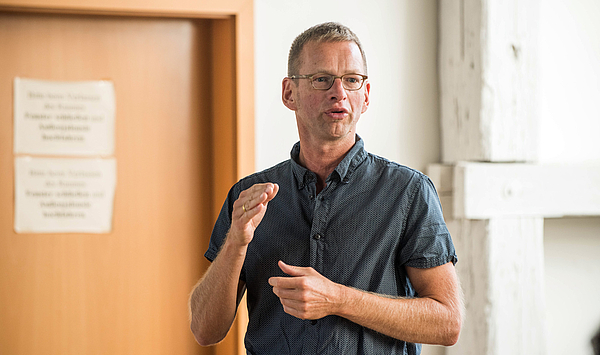
Music in utopias - utopias in music
Musicological symposium and concert explores distant worlds
The spectrum of topics at an exciting conference in Weimar ranges from dystopian science fiction to the private mystical utopias of composer Karlheinz Stockhausen. The Department of Musicology Weimar-Jena is inviting the public to the symposium ‘Sitting Here in Nowhere Land. Music in Utopias - Utopias in Music’ on Monday, 16 and Tuesday, 17 September in the Festsaal Fürstenhaus of the Weimar Music University.
The event, organised by professors Dr Nina Noeske and Dr Martin Pfleiderer, will conclude on Tuesday at 19:30 with the concert ‘Utopia - Dystopia’ with works by Maximilian Marcoll and Jörn Arnecke. Admission is free.
In the present, which is characterised by rather dystopian visions of the future with the climate crisis, pandemic and wars, utopian thinking is experiencing a renaissance. Utopias sketch an ideal picture of human coexistence in the no-man's land of a distant island, another planet or - since the second half of the 18th century - in a distant future, in which music often plays an important role. The Weimar conference aims to continue the discourse on music and utopia.
Music in utopias: Music and musical practices often occupy a prominent place in social utopias, literary utopias and science fiction novels. But how are they linked to the concept of a happy coexistence and a successful life? Does music have more ethical qualities or does music simply stand for the playful, sensual enjoyment of the moment?
Utopias in music: in this sense, the so-called ‘beautiful passages’ (Adorno) offer a brief glimpse of paradise. But music also refers to a better (utopian) world through programmatic titles or song lyrics, in music theatre or through associated images, describes it or creates its own utopian scenario.
In addition to all textual and visual references, the question arises as to whether and how the reference to the utopian is organised in terms of sound: as an acoustic mirror of an inadequate present, or as an outlook into a utopian sound world? Examples can be found in the works of Stockhausen, Nono and Pagh-Paan, among others, but also in sound utopias beyond the binary gender order.
More informationcan be found here ...
[16.08.2024]
